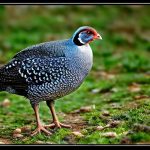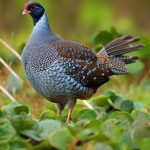Guinea fowl, also known as pintades, are a type of poultry that are native to Africa. They are known for their unique appearance, with speckled feathers and a helmet-like crest on their heads. Guinea fowl are popular for their meat, which is lean and flavorful, making them a sought-after choice for meat production. They are also valued for their ability to control pests such as ticks and insects, making them a valuable addition to a farm or homestead. Guinea fowl are hardy birds that can thrive in a variety of climates, making them a versatile option for meat production.
Guinea fowl come in a variety of breeds, each with its own unique characteristics and traits. They are known for their ability to forage for food, making them a low-maintenance option for meat production. Guinea fowl are also known for their loud calls, which can serve as a natural alarm system on a farm. They are social birds that thrive in flocks, making them a great addition to a multi-species farm. Overall, guinea fowl are a unique and valuable option for meat production, with their flavorful meat and pest control abilities making them a popular choice for farmers and homesteaders alike.
Key Takeaways
- Guinea fowl are small, ground-dwelling birds native to Africa and are known for their flavorful meat and pest control abilities.
- When selecting breeds for meat production, consider the size, growth rate, and feed conversion ratio of the guinea fowl to ensure a successful meat production operation.
- Proper housing and care for guinea fowl includes providing adequate space, protection from predators, and access to clean water and nutritious feed.
- Feeding and nutrition for meat production should include a balanced diet of high-quality feed, supplemented with greens, grains, and insects to promote healthy growth and meat quality.
- Health and disease management is crucial for guinea fowl, with regular vaccinations, parasite control, and proper sanitation practices to prevent illness and ensure a healthy flock.
Selecting the Right Breeds for Meat Production
When it comes to selecting the right breeds of guinea fowl for meat production, there are several factors to consider. Different breeds have different characteristics and traits that can impact their suitability for meat production. Some popular breeds for meat production include the French Guinea, the White Guinea, and the Pearl Guinea. These breeds are known for their large size and flavorful meat, making them ideal choices for meat production.
The French Guinea is a popular choice for meat production due to its large size and fast growth rate. This breed is known for its plump breast meat and tender texture, making it a favorite among consumers. The White Guinea is another popular choice for meat production, known for its lean and flavorful meat. This breed is also valued for its high egg production, making it a versatile option for farmers. The Pearl Guinea is known for its striking appearance and delicious meat, making it a popular choice for meat production. When selecting breeds for meat production, it’s important to consider factors such as size, growth rate, and flavor to ensure the best possible outcome.
Housing and Care for Guinea Fowl
Proper housing and care are essential for raising guinea fowl for meat production. Guinea fowl require a secure and predator-proof coop or housing structure to protect them from predators such as foxes, raccoons, and birds of prey. The coop should provide adequate space for the guinea fowl to roost and nest, as well as protection from the elements. It’s important to provide ample ventilation in the coop to prevent moisture buildup and ensure good air quality. Additionally, guinea fowl require access to outdoor space for foraging and exercise, so it’s important to provide a secure outdoor enclosure or free-range area.
Guinea fowl also require proper care to ensure their health and well-being. They should be provided with a balanced diet, fresh water, and regular access to grit to aid in digestion. It’s important to monitor the flock for signs of illness or injury and provide prompt veterinary care when needed. Additionally, guinea fowl should be provided with dust baths to help keep their feathers clean and healthy. Overall, proper housing and care are essential for raising guinea fowl for meat production, ensuring the health and well-being of the flock.
Feeding and Nutrition for Meat Production
Feeding and nutrition play a crucial role in raising guinea fowl for meat production. Guinea fowl require a balanced diet that provides the necessary nutrients for growth and development. A high-quality commercial poultry feed formulated specifically for guinea fowl is an ideal option, providing the essential vitamins, minerals, and protein they need. Additionally, guinea fowl should have access to fresh water at all times to prevent dehydration and ensure proper hydration.
In addition to commercial feed, guinea fowl can also benefit from access to pasture and forage. They are natural foragers and enjoy eating insects, seeds, and plants, so providing access to outdoor space for grazing can supplement their diet and improve the flavor of their meat. It’s important to monitor the flock’s body condition and adjust their diet as needed to ensure they are receiving adequate nutrition. Overall, providing a balanced diet that meets the nutritional needs of guinea fowl is essential for raising them for meat production.
Health and Disease Management
Maintaining the health of guinea fowl is essential for successful meat production. Preventing disease and managing health issues is crucial to ensuring the well-being of the flock and the quality of the meat produced. Regular health checks and monitoring of the flock can help identify any potential issues early on. Providing a clean and dry living environment can help prevent common health problems such as respiratory issues and parasites.
It’s important to work with a veterinarian who has experience with poultry to develop a health management plan for the flock. This may include vaccinations, parasite control, and regular check-ups to monitor the overall health of the birds. Additionally, practicing good biosecurity measures can help prevent the spread of disease within the flock. This includes limiting exposure to other birds, quarantining new additions to the flock, and practicing good hygiene when handling the birds.
Processing and Butchering Guinea Fowl

Once guinea fowl have reached the desired weight for meat production, it’s time to process and butcher them. Proper processing and butchering techniques are essential for producing high-quality meat. This may include humane slaughter methods followed by plucking or skinning the birds. It’s important to handle the birds with care during processing to minimize stress and ensure the quality of the meat.
After processing, the meat should be chilled promptly to ensure food safety and quality. Proper packaging and storage techniques can help preserve the flavor and texture of the meat. Some farmers may choose to process the meat themselves, while others may work with a local butcher or processing facility. Regardless of the method chosen, proper processing and butchering techniques are essential for producing high-quality guinea fowl meat.
Marketing and Selling Guinea Fowl Meat
Marketing and selling guinea fowl meat can be an exciting opportunity for farmers looking to diversify their products. There is a growing demand for specialty meats such as guinea fowl due to their unique flavor and lean profile. Developing a marketing plan that highlights the benefits of guinea fowl meat can help attract customers. This may include promoting the flavor, nutritional benefits, and sustainable farming practices used in raising the birds.
Selling guinea fowl meat may involve direct marketing through farmers’ markets, farm stands, or online sales platforms. Building relationships with local restaurants or specialty food stores can also create opportunities to sell guinea fowl meat to a wider audience. It’s important to comply with local regulations regarding meat sales and processing to ensure compliance with food safety standards.
In conclusion, raising guinea fowl for meat production can be a rewarding endeavor for farmers looking to diversify their products. Selecting the right breeds, providing proper housing and care, managing feeding and nutrition, maintaining health and disease management, processing and butchering techniques, as well as developing a marketing plan are all essential components of successful guinea fowl meat production. With careful planning and attention to detail, farmers can produce high-quality guinea fowl meat that meets the growing demand for specialty meats in today’s market.
If you’re considering raising guinea fowl for meat, you may also be interested in optimizing the living conditions for your poultry. Check out this insightful article on chicken coop interior ideas to ensure that your guinea fowl have a comfortable and safe environment. Creating a suitable floor for your coop is also crucial, so take a look at this article on flooring options for chicken coops to make informed decisions. Additionally, if you’re exploring different poultry options, you might want to learn about the egg-laying habits of geese in this article on how many eggs geese lay.
FAQs
What is guinea fowl?
Guinea fowl are domesticated birds that are raised for their meat. They are known for their distinctive spotted feathers and are native to Africa.
What are the benefits of keeping guinea fowl for meat?
Guinea fowl meat is lean and has a rich, gamey flavor. They are also known for their ability to control pests such as ticks and insects, making them a valuable addition to a farm or homestead.
What do guinea fowl eat?
Guinea fowl are omnivores and eat a diet that consists of grains, seeds, insects, and small invertebrates. They are also known to forage for food, making them relatively low-maintenance to feed.
How are guinea fowl raised for meat?
Guinea fowl can be raised in a free-range or semi-free-range system, allowing them to forage for food and exercise. They can also be raised in a more confined system with access to a balanced diet and proper housing.
What are some considerations for raising guinea fowl for meat?
Raising guinea fowl for meat requires proper housing, access to clean water, and a balanced diet. They are also susceptible to predators, so adequate protection is necessary. Additionally, proper handling and processing techniques are important for ensuring the quality of the meat.
What is the meat quality of guinea fowl?
Guinea fowl meat is lean, flavorful, and has a slightly gamey taste. It is considered a delicacy in many parts of the world and is often compared to chicken or pheasant in terms of taste and texture.
Meet Walter, the feathered-friend fanatic of Florida! Nestled in the sunshine state, Walter struts through life with his feathered companions, clucking his way to happiness. With a coop that’s fancier than a five-star hotel, he’s the Don Juan of the chicken world. When he’s not teaching his hens to do the cha-cha, you’ll find him in a heated debate with his prized rooster, Sir Clucks-a-Lot. Walter’s poultry passion is no yolk; he’s the sunny-side-up guy you never knew you needed in your flock of friends!







